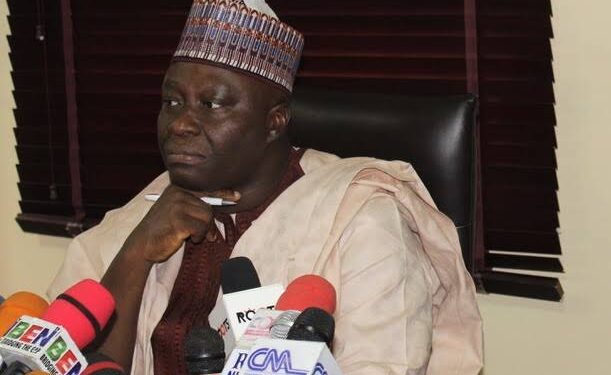The remarkable response of National Publicity Secretary of the Nigerian Bar Association, Mr. Kunle Edun, to the N500,000-N5m jacking of hate speech fine has obviously been jettisoned.
Edun’s claim that “the press as the fourth estate of the realm plays the constitutional role of our democracy in the face of increasing impunity, seemingly official policy of disobedience of court orders, sheer exhibition of rascality by some of our security agencies and unbridled corruption in government” is roughly reminiscent of Nelson Mandela’s assertion that “a critical, independent and investigative press is the lifeblood of any democracy”; as a consequence, “the press must be free from state interference.
It must have the economic courage to stand up to the blandishments of government officials. It must enjoy the protection of the Constitution so that it can protect our rights as citizens.” In the face of feed-forward fastidious flibbertigibbets in the political spectrum of Nigeria, however, it is sort of noteworthy to say the press ought to possess “the political courage to stand up to the blandishments of government officials”.
Surely, the press is part and parcel of the tiers of government in Nigeria. The press, constitutionally and fundamentally, is enmeshed in the responsibility of relating the “big” and “small” stories to the society. In particular, the press is the voice of the nation.
Watching over the press (of course, shouldn’t the press be watched over, at least to some extent?) potentially could wreak wanton banditry or “blandishments”. It could be very discouraging and disparaging to decide what the press should say and what not to say. And stifling free speech – I mean, the press’s free speech! – might be pretty dire, especially unleashing unquenchable repercussions.
So when the Director General of the National Broadcasting Commission, Prof. Armstrong Idachaba, imposed a fine of N3m each on Channels TV, Africa Independent Television, AIT and Arise TV, owing to the fact of their much-hyping of the #EndSARS protest, I could not but be taken aback by the relegation and peregrination of the press in Nigeria.
Government officials, crucially in-person of the Minister of Information, Lai Mohammed, are beginning to make the pungent impression that Nigerian democracy would be widely detestable and abominable if the “watchdogs” unwaveringly “bark-bite” the sound-bite of silly-minded and superfluous leaders.
Well, it is clear that what the NBC calls “unprofessional coverage” of the #EndSARS protest by these electronic media might be gearing towards the “unprofessional carnage” of the Nigeria media in general. To me, the press is the voice for the voiceless. And if the press is deemed inimical and insidious to the growth and development of Nigeria, then it is not uncertain that we couldn’t attain “a nation where peace and justice reign”.
I do not want to believe that the inflammatory fining of these broadcasting media was a springboard of silencing internal corrupt practices. That would have been a gross hijacking of the well-intentioned #EndSARS protest as it were. Even though there’s some hate speech fine, should that stop the sporadic coverage of the media whose independent roles in the media spaces have been earmarked for full-fledged stories?
If it so be that we have two classes and cases of hijackers of the germaneness and genuiness of the #EndSARS protest – on one hand, the looting anti-#EndSARS peaceful protesters and “constitutionalised thugs”, on the other hand, who have perpetually been proactive in “unprofessional coverage” – it would be a pity that Nigeria could be fined among every other country as most miserable.
The lot of Nigeria with a repressed and suppressed press is most likely to be that of Belarus, where the definitional inexactitude of the system of government there is extremely discombobulating. ‘Putative President’ Alexander Lukashenko, 26 years in power, has intelligently and internationally proven incorrigible and indefatigable in stepping down and, most importantly, in kowtowing to the main opposition leader’s Svetlana Tikhanovskaya’s logistic activation function of his recursive roughshod and rigging of the August 9 ‘presidential election’.
And instead of Nigerian leaders bridled and saddled with the responsibility of ensuring the regulation of the standardisation of the media by promoting and supporting the press in airing the battle for the soul of the nation, the Federal Government is rather eviscerated and energetic in championing characteristically “un‘media’ted” cabals in the grapevine of politicking.
We should not be making #EndSARS end the rights and freedoms of the press. Ending the explanatory inadequacies of the Special Anti-Robbery Squad shouldn’t have been an avenue to profligate the press, at all. In fact, the dead-end of peace and justice reigning in Nigeria is not far-fetched. The press – in one way or another – does promote peace.
But in a bid to beam some light on the burgeoning buccal cavity and pernicious cupidity of Nigeria’s current dispensation, the press is groundlessly rocked down on with speeches that should be exponentially fined.
Super-spreading fake or unverifiable news shouldn’t be the onerous business of the press. The circulatory mechanism of news production and propensity to multi-variant espionage should be highly discouraged. That makes the press unreliable.
Delinquent of physical coverage, news sourced and editorially headlined from even so-called time-tested authorities could tremendously tarnish the image of the nation. And so a lot of conscientiousness and judiciousness is what the press should be clad with.
The so-called brown or ‘electronic’ envelope negotiated in the corridors of power is a thing Idachaba and the like should sporadically “fine”, thereby contributing to the professional ethics and progress of the press.
*Ige, a public affairs analyst, wrote via: [email protected]




































